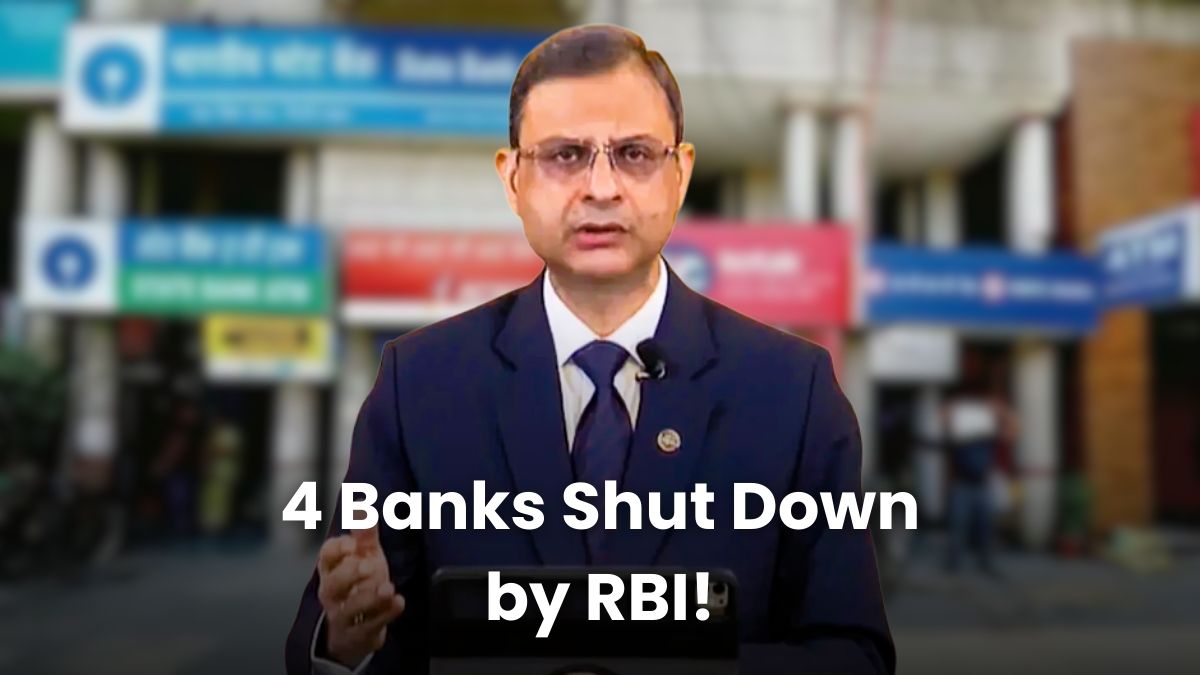RBI Crackdown 2025 – The Reserve Bank of India (RBI) has taken strict action against four cooperative banks by cancelling their licenses. This move comes after repeated violations of banking rules and concerns over their financial health. If you or someone you know had money in one of these banks, it’s natural to feel anxious. But don’t worry your money is insured to an extent. Let’s break down what happened, why it happened, and what you need to do next in simple terms.
Why Did RBI Take This Action?
RBI has one job when it comes to banks making sure they follow the rules and are financially stable. When a bank starts ignoring guidelines, risks depositors’ money, or can’t handle its finances well, RBI steps in to protect the public. In this case, these four cooperative banks failed to meet key requirements:
- They didn’t follow RBI’s regulations consistently.
- Their financial condition was getting worse.
- They couldn’t pay back depositors on time.
- They didn’t have enough capital to keep running.
- Poor internal management and increasing bad loans added to their problems.
So, to protect depositors and maintain the overall health of the banking sector, RBI had to pull the plug on these banks’ operations.
Which Banks Have Been Affected?
As per the latest update, the licenses of four cooperative banks across different states have been cancelled. The actual names may differ in official records, but here’s an example to help understand:
- XYZ Cooperative Bank (Maharashtra) – Shut down due to poor finances
- ABC Urban Co-op Bank (Gujarat) – Failed to comply with regulations
- Shree Janata Sahakari Bank (Karnataka) – Bad loans and mismanagement
- Sudarshan Cooperative Bank (Uttar Pradesh) – Hit by liquidity problems
Each of these banks had thousands of depositors. But there’s good news if you had money in any of these banks, up to five lakh rupees per account holder is protected under the DICGC insurance scheme.
What Happens to Your Money Now?
Once a bank’s license is cancelled, it can’t do any banking activity. That means you can’t deposit or withdraw money from that bank anymore. But here’s where the Deposit Insurance and Credit Guarantee Corporation (DICGC) steps in.
This body, under RBI, insures deposits in Indian banks up to five lakh rupees. So even if a bank fails, you will still get back this amount, whether your money is in savings, fixed deposits, or current accounts.
What’s the Process for Getting Your Money Back?
You don’t need to run around or take any legal steps right now. There’s a standard process that kicks off after such events:
- License Cancelled – Bank is officially closed
- Transactions Halted – No further activity allowed in the bank
- Liquidator Appointed – An official is chosen to handle the bank’s closure
- DICGC Gets Depositor List – Bank shares account details
- Payout Begins – Refunds up to five lakh start within 90 days
- Extra Dues Settled – Anything beyond five lakh (if possible) is paid later
Just ensure your account details are up to date, and you have documents like your passbook, ID proof, and any bank statements ready.
What Should You Do Now?
If you’re a customer of one of these banks, here’s what you should keep in mind:
- Don’t panic. Your money (up to five lakh) is safe under insurance.
- Avoid falling for scam calls or emails that promise quick refunds.
- Keep your documents safe and wait for official instructions.
- Check updates on the RBI or DICGC website for correct information.
- Visit your bank only when instructed, and avoid crowding branch offices unnecessarily.
What This Means for the Banking Sector
This move by RBI sends a strong message that it won’t tolerate mismanagement, even in small banks. It also pushes other cooperative banks to tighten their operations and follow rules more seriously. In the long run, this helps build trust among depositors and ensures a stronger financial system.
Some effects we might see:
- More mergers of small cooperative banks with bigger players
- Increase in checks and digital audits by regulators
- Public moving towards nationalized or private banks for safety
RBI’s Assurance to the Public
The RBI has clearly stated that the banking system in India is still strong and well-managed. This action doesn’t mean there’s a crisis it’s a preventive step to avoid bigger trouble down the road. The goal is to protect depositors and maintain confidence in the banking system.
So if you’re a customer of a cooperative bank, take this as a wake-up call. Stay updated, choose banks wisely, and always verify financial news from official sources. Your money matters — and so does who you trust it with.





